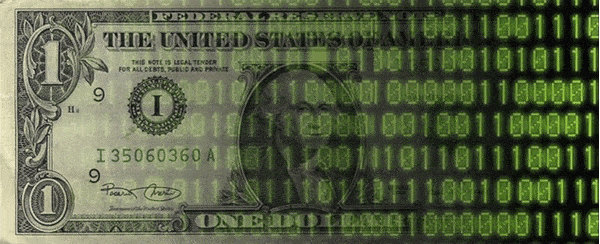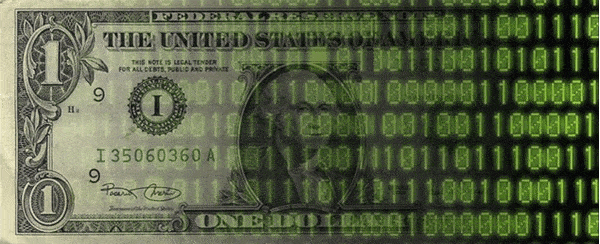
We live in a world in which more and more things happen electronically. It is now possible to buy all your clothes online, all your books, all your food, and have them all delivered to you. Online communication allows us to communicate with almost anyone on the planet, anywhere, at any time. Someone who had fallen asleep 30 years ago would be amazed at how different things are. That extends to the realm of payments as well. Millions of people now access their bank accounts online, transferring money between accounts and paying off credit cards. Payment services such as PayPal are used by more and more merchants. Cash is being displaced by credit and debit cards, which are themselves beginning to be displaced by new digital currencies and payment systems such as Bitcoin, Samsung Pay, and Apple Pay. A world in which everything is transacted digitally may not be far off. But will this digital revolution enable a dream world for consumers or a never-ending nightmare?
Digital currencies, electronic payments, and online financial services are turning the monetary, financial, and banking systems on their heads. But despite all the advances brought about by the digital revolution, there are still quite a few drawbacks. The most obvious is that it is reliant on electricity. One major hurricane knocking out power, a mid-summer brownout, or a hacker attack on the power grid could bring commerce to a halt. With cash, transactions are still possible. With digital payments, civilization comes to an end until power is restored. Unless you have food stored or goods with which to barter, you’re out of luck. Just imagine a city like New York with no power and no way to buy or sell anything. It won’t be pretty. But those instances will hopefully be few and far between. There are other, more important problems with digital currencies and payments.
With digital currencies such as Bitcoin, there is the problem that they are created out of thin air. One bitcoin represents the successful completion of a cryptographic puzzle, but all that means is that some computing power was used up to create a unique electronic file. That’s all it is, just a series of ones and zeros. There is nothing tangible about Bitcoin and, indeed, if you lose the hard drive on which you stored your bitcoins, those bitcoins are lost forever. Commodity money developed for a reason, it was something that, while able to be used as money, nonetheless could also be used. Gold and silver could be made into jewelry, cows and goats could be eaten, cigarettes could be smoked. Even paper money has another use, as toilet paper, note paper, or to be burned in a furnace or fireplace to produce heat. Money developed not because someone came up with the idea to use something as “money” but because one commodity out of the many hundreds and thousands desired by people had such universal appeal that it was able to act as a medium of exchange. Money is a spontaneous creation resulting from the interactions of consumers within a free market, not something created by a single entity.
Commodity monies also have finite limits, some more than others, but they cannot be reproduced infinitely. Not so with digital currencies. Bitcoin currently has a limit to the number of bitcoins that can be created, but who is to say that that can’t change in the future when developers in the Bitcoin community fall prey to the temptation to create more money, believing that more money is the key to greater wealth? We’re already seeing debate over the size of the blockchain, with some developers hoping to create a new Bitcoin branch with larger blockchain sizes. With digital currencies you are at the mercy of the currency’s creator or controller, hoping that they don’t take advantage of their ability as the monetary authority to defraud the public through creating additional monetary units. It was problematic when central banks created more paper money than was backed by gold or silver, it is problematic when banks create digital bank balances that they use to purchase assets through quantitative easing, and it will be problematic when future digital currencies are manipulated to benefit their issuers at the expense of everyone else.
Digital payment services are beset by the same problems that beset traditional banks and payment processors, namely that they benefit from barriers to entry resulting from government regulation and can enact policies detrimental to consumers. Take a look at PayPal, for instance. PayPal’s terms of service forbid use of the service to buy or sell firearms, firearms parts, or firearms accessories. Many individuals who have used PayPal to sell firearms parts find their accounts frozen or shut down by PayPal. Similar things have happened to gun stores having their bank accounts frozen or having their credit card payment processors refuse to process any further payments, sometimes at the request of banking regulators.
In a free market, PayPal’s refusal to process firearms-related transactions would lead to dozens or hundreds of new entrants popping up to compete against PayPal. Heck, even if PayPal did allow firearms-related transactions it would still have hundreds of competitors. But free markets don’t exist, only highly government-regulated and controlled markets. The number of laws and regulations that have to be complied with before one can go into the money services business would boggle the mind of the layman. This legal and regulatory complexity allows the first firms that overcome the hurdles to establish a position within the legally-privileged oligopoly and easily fend off competition.
Cases such as this will only be more widespread in the future, especially as governments continue to pursue the war on cash. If cash is eliminated and electronic systems become the only way anyone can pay for anything, all it will take is a little bit of government pressure on payment system operators to stop processing payments for X or Y and voila, you can longer buy X or Y. What good is money in the bank if you can’t use it to buy what you want? In fact, governments may dispense with pressure on payment systems and just monitor transactions as they occur, automatically rejecting payments for goods they don’t want sold or to firms they want to punish. If you don’t like that, too bad, you have no choice because cash will have been banned. Your money is locked in the banking system and you can’t withdraw it. The only way it can exit is for you to buy some sort of tangible goods and hope that you can trade them for something you want.
This ties into the final problem with digital currencies, that they do not allow for anonymity. Every transaction made electronically can be tracked and traced. If every purchase you make is done electronically, your entire purchase history is open to scrutiny. Services that purport to allow anonymity for electronic transactions may find themselves forced to provide backdoors to allow government access, or they may be shut down entirely. Governments are prosecuting a war on cash specifically to drive everything digital so that they can track all financial transactions. The supposed arguments for the war on cash are for combating terrorism, drug dealing, human trafficking, and other criminal activity. The real reason is that the ability to oversee and track all payments and revenues will allow for more effective tax collection and monitoring of behavior the government views as undesirable.
While digital currencies and payments can be useful adjuncts to a monetary system, relying on digital currencies and payments exclusively is regressive. By banning cash and relying solely on electronic payments, the ability of governments and banks to force their dictates on consumers will be enhanced dramatically. Rather than providing convenience for consumers, moving to an all-digital monetary system will enable an even more powerful and repressive government.
Reprinted with permission from the Carl Menger Center for Money and Banking.


